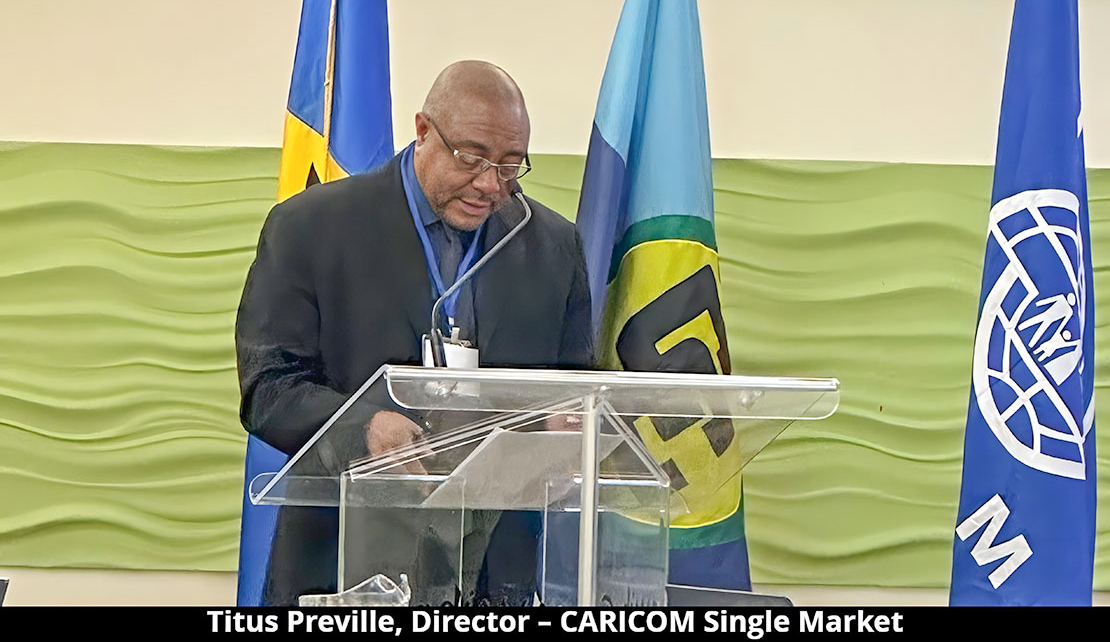CARICOM Assessing critical CSME Economic Free Movement Data

GEORGETOWN, Guyana, August 15, 2023 - Director of the CARICOM Single Market,Titus Preville says CARICOM is now assessing the data in relation to the movement of CARICOM nationals arising from the exercise of their rights to move throughout the region either as skilled nationals, temporary service providers or in exercise of the right to establish economic enterprises.
Addressing a free movement workshop at the Radisson Hotel in Barbados, Mr. Preville said while there was a robust system to analyze the data in relation to the movement of persons associated with tourism travel, there was no such data on the movement of CARICOM nationals associated with economic endeavors within the Community.
To compound the issue of being in a position to provide answers on our free movement regime for people driven by economic factors, the Conference of Heads of Government have decided that full free movement of CARICOM nationals must be a reality by March 31, 2024.
What does this mean in terms of facilitating that mandate in terms of systems that should be operational to ensure that the Community is able to measure whether the CSME, which is the regional economic integration arrangement, is delivering on the intended objectives.
The CSME Director pointed out that with the collection of the appropriate data, the CSME Unit will be able to answer a number of questions critical to the question of how our free movement regime supports the human resource development plans of Member States. These include:
1. What is the labour migration pattern in the CSME Member States?
2. Are most of our skilled nationals moving to destination countries outside the Region and if so why?
3. Is it administratively easier to move to a country outside the CSME than it is within the CSME?
4. Are the opportunities that are made available to our CSME nationals in the main countries of destination outside the CSME Region more attractive than within our own Region?
5. If so, can we compete or should we not look to developing a strategic migration policy and strategy for each Member State based on its circumstance and a resulting regional policy and strategy?
6. Are we approaching free movement and migration as part of our national development strategy?
He explained that among the reasons the CSME was established, was to expand regional production and trade among Member States, thereby building competitiveness of regional enterprises within the Single Market context and secondly, building the capacity and competitiveness to compete in markets external to the CSME region.
“It was perceived that achieving these two objectives would address the lingering issues of high unemployment, persistent poverty, and sustainable economic growth,” Preville said.
He pointed out that The movement of CARICOM nationals for non-economic activity such as vacationing is well facilitated with the absence of visa requirements and automatic six months stay in any receiving Member State.
The Single Market Director noted that at present, the Revised Treaty of Chaguaramas accommodates the movement of CARICOM skilled nationals seeking employment in 12 approved categories in any sector in any Member State, save for two Member States, Antigua and Barbuda and St. Kitts and Nevis who have obtained derogations for two categories of skilled nationals in keeping with provisions of the Revised Treaty under Article 27 (4).
“Cumulatively, between 2007 and 2018, we estimate that about 15,000 CARICOM nationals moved utilizing either the skills or the ‘right of establishment’ regimes. Our estimates show that twice as many people moved in the first five years, that is, between 2007 and 2012 than between the second five years, 2013 and 2018,” Preville noted.
“We were also able to deduce that annually, between 2013 and 2018, approximately 680 CSME nationals from one Member State moved to other Member States in the Community. Importantly, the countries that were net recipients of skilled nationals in that period were Trinidad and Tobago, Barbados, St. Kitts and Nevis and Antigua and Barbuda in that order of magnitude.
Preville advised that “The net senders in order of magnitude were Guyana, Jamaica, Dominica, St. Vincent and the Grenadines, Saint Lucia, Grenada and Suriname. In Belize, the overall flow tended to be even,” he added.
-30-
